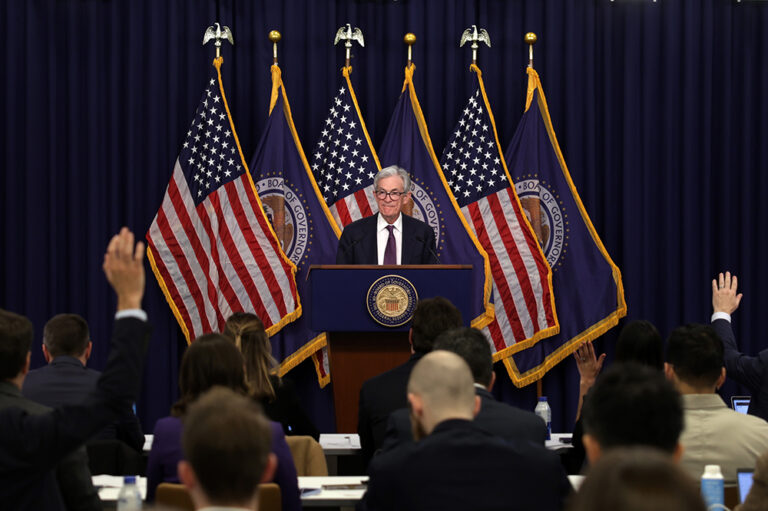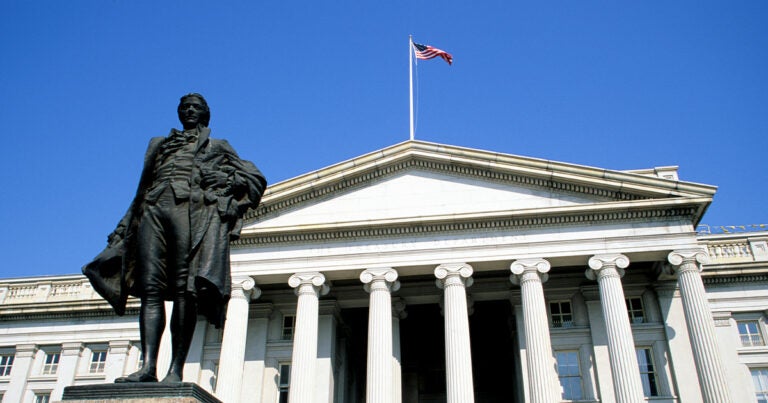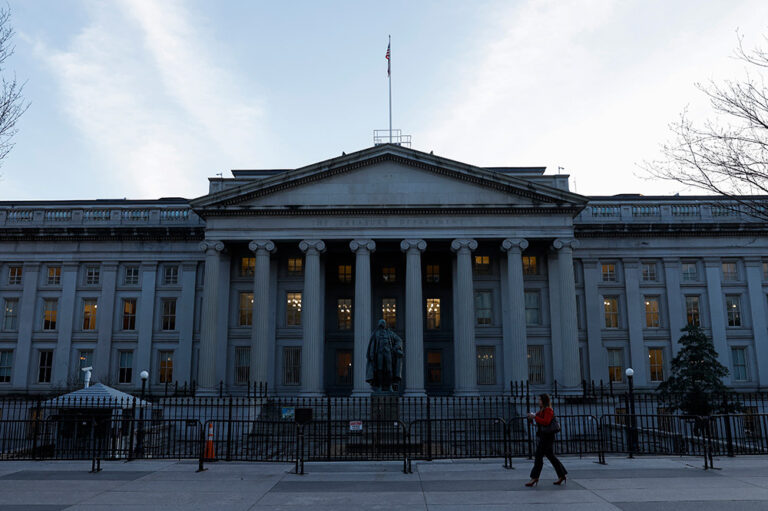Last night’s third and final presidential debate included a dedicated segment on the national debt, giving both candidates a chance to talk about their vision for addressing America’s long-term fiscal challenges.
Moderator Chris Wallace began the segment by citing the historically high rate of debt to GDP, and asked the candidates, “Why are both of you ignoring this problem?”
Below is a transcript and video of the debt-related questions and the candidates’ responses.
Throughout the election season, the Peterson Foundation has been calling for candidates at all levels to provide fiscal plans for stabilizing and reducing the national debt as a share of the economy over the long term. Through our campaign to date, voters have sent more than 75,000 tweets and emails directly to presidential and Congressional candidates asking them to address our rising national debt. There’s still time to add your voice to the call to action.

CHRIS WALLACE: Mr. Trump, Secretary Clinton — no, we need to move on to our final segment, and that is the national debt, which has not been discussed until tonight.
Our national debt, as a share of the economy, our GDP, is now 77 percent. That’s the highest since just after World War II. But the nonpartisan Committee for a Responsible Federal Budget says, Secretary Clinton, under your plan, debt would rise to 86 percent of GDP over the next 10 years. Mr. Trump, under your plan, they say it would rise to 105 percent of GDP over the next 10 years. The question is, why are both of you ignoring this problem? Mr. Trump, you go first.
DONALD TRUMP: Well, I say they’re wrong, because I’m going to create tremendous jobs. And we’re bringing GDP from, really, 1 percent, which is what it is now, and if she got in, it will be less than zero. But we’re bringing it from 1 percent up to 4 percent. And I actually think we can go higher than 4 percent. I think you can go to 5 percent or 6 percent. And if we do, you don’t have to bother asking your question, because we have a tremendous machine. We will have created a tremendous economic machine once again. To do that, we’re taking back jobs. We’re not going to let our companies be raided by other countries where we lose all our jobs, we don’t make our product anymore. It’s very sad. But I’m going to create a — the kind of a country that we were from the standpoint of industry. We used to be there. We’ve given it up. We’ve become very, very sloppy.
We’ve had people that are political hacks making the biggest deals in the world, bigger than companies. You take these big companies, these trade deals are far bigger than these companies, and yet we don’t use our great leaders, many of whom back me and many of whom back Hillary, I must say. But we don’t use those people. Those are the people — these are the greatest negotiators in the world. We have the greatest businesspeople in the world. We have to use them to negotiate our trade deals.
We use political hacks. We use people that get the position because they gave — they made a campaign contribution and they’re dealing with China and people that are very much smarter than they are. So we have to use our great people.
But that being said, we will create an economic machine the likes of which we haven’t seen in many decades. And people, Chris, will again go back to work and they’ll make a lot of money. And we’ll have companies that will grow and expand and start from new.
WALLACE: Secretary Clinton?
HILLARY CLINTON: Well, first, when I hear Donald talk like that and know that his slogan is “Make America Great Again,” I wonder when he thought America was great. And before he rushes and says, “You know, before you and President Obama were there,” I think it’s important to recognize that he has been criticizing our government for decades.
You know, back in 1987, he took out a $100,000 ad in the New York Times, during the time when President Reagan was president, and basically said exactly what he just said now, that we were the laughingstock of the world. He was criticizing President Reagan. This is the way Donald thinks about himself, puts himself into, you know, the middle and says, “You know, I alone can fix it,” as he said on the convention stage.
But if you look at the debt, which is the issue you asked about, Chris, I pay for everything I’m proposing. I do not add a penny to the national debt. I take that very seriously, because I do think it’s one of the issues we’ve got to come to grips with.
So when I talk about how we’re going to pay for education, how we’re going to invest in infrastructure, how we’re going to get the cost of prescription drugs down, and a lot of the other issues that people talk to me about all the time, I’ve made it very clear we are going where the money is. We are going to ask the wealthy and corporations to pay their fair share.
And there is no evidence whatsoever that that will slow down or diminish our growth. In fact, I think just the opposite. We’ll have what economists call middle-out growth. We’ve got to get back to rebuilding the middle class, the families of America. That’s where growth will come from. That’s why I want to invest in you. I want to invest in your family.
And I think that’s the smartest way to grow the economy, to make the economy fairer. And we just have a big disagreement about this. It may be because of our experiences. You know, he started off with his dad as a millionaire...
TRUMP: Yeah, yeah, we’ve heard — we’ve heard this before, Hillary.
CLINTON: I started off with — my dad was a small-business man.
TRUMP: We’ve heard this before.
CLINTON: And I think it — you know, it’s a difference that affects how we see the world and what we want to do with the economy.
WALLACE: Time.
TRUMP: Thank you, Hillary. Could I just respond?
WALLACE: Well, no, sir, because we’re running out of time...
TRUMP: Because I did disagree with Ronald Reagan very strongly on trade. I disagreed with him. We should have been much tougher on trade even then. I’ve been waiting for years. Nobody does it right.
WALLACE: OK.
TRUMP: And frankly, now we’re going to do it right.
WALLACE: All right. The one last area I want to get into with you in this debate is the fact that the biggest driver of our debt is entitlements, which is 60 percent of all federal spending. Now, the Committee for a Responsible Federal Budget has looked at both of your plans and they say neither of you has a serious plan that is going to solve the fact that Medicare’s going to run out of money in the 2020s, Social Security is going to run out of money in the 2030s, and at that time, recipients are going to take huge cuts in their benefits.
So, in effect, the final question I want to ask you in this regard is — and let me start with you, Mr. Trump, would President Trump make a deal to save Medicare and Social Security that included both tax increases and benefit cuts, in effect, a grand bargain on entitlements?
TRUMP: I’m cutting taxes. We’re going to grow the economy. It’s going to grow at a record rate of growth.
WALLACE: That’s not going to help in the entitlements.
TRUMP: No, it’s going to totally help you. And one thing we have to do: Repeal and replace the disaster known as Obamacare. It’s destroying our country. It’s destroying our businesses, our small business and our big businesses. We have to repeal and replace Obamacare.
You take a look at the kind of numbers that that will cost us in the year ’17, it is a disaster. If we don’t repeal and replace — now, it’s probably going to die of its own weight. But Obamacare has to go. It’s — the premiums are going up 60 percent, 70 percent, 80 percent. Next year they’re going to go up over 100 percent.
And I’m really glad that the premiums have started — at least the people see what’s happening, because she wants to keep Obamacare and she wants to make it even worse, and it can’t get any worse. Bad health care at the most expensive price. We have to repeal and replace Obamacare.
WALLACE: And, Secretary Clinton, same question, because at this point, Social Security and Medicare are going to run out, the trust funds are going to run out of money. Will you as president entertain — will you consider a grand bargain, a deal that includes both tax increases and benefit cuts to try to save both programs?
CLINTON: Well, Chris, I am on record as saying that we need to put more money into the Social Security Trust Fund. That’s part of my commitment to raise taxes on the wealthy. My Social Security payroll contribution will go up, as will Donald’s, assuming he can’t figure out how to get out of it. But what we want to do is to replenish the Social Security Trust Fund...
TRUMP: Such a nasty woman.
CLINTON: ... by making sure that we have sufficient resources, and that will come from either raising the cap and/or finding other ways to get more money into it. I will not cut benefits. I want to enhance benefits for low-income workers and for women who have been disadvantaged by the current Social Security system.
But what Donald is proposing with these massive tax cuts will result in a $20 trillion additional national debt. That will have dire consequences for Social Security and Medicare.
And I’ll say something about the Affordable Care Act, which he wants to repeal. The Affordable Care Act extended the solvency of the Medicare Trust Fund. So if repeals it, our Medicare problem gets worse. What we need to do is go after...
TRUMP: Your husband disagrees with you.
CLINTON: ... the long-term health care drivers. We’ve got to get costs down, increase value, emphasize wellness. I have a plan for doing that. And I think that we will be able to get entitlement spending under control by with more resources and harder decisions.
Photo by Pool/Getty Images
Further Reading
The Fed Reduced the Short-Term Rate Again, but Interest Costs Remain High
High interest rates on U.S. Treasury securities increase the federal government’s borrowing costs.
What Types of Securities Does the Treasury Issue?
Let’s take a closer look at a few key characteristics of Treasury borrowing that can affect its budgetary cost.
Quarterly Treasury Refunding Statement: Borrowing Up Year Over Year
Key highlights from the most recent Quarterly Refunding include an increase in anticipated borrowing of $158 billion compared to the same period in the previous year.


